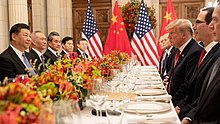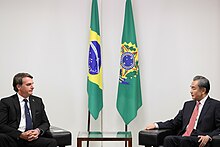Wang Yi | |
|---|---|
| 王毅 | |
 Wang in 2023 | |
| Director of the Office of the Central Foreign Affairs Commission | |
| Assumed office 1 January 2023 | |
| General Secretary | Xi Jinping |
| Foreign Minister | Qin Gang Himself |
| Preceded by | Yang Jiechi |
| Minister of Foreign Affairs | |
| Assumed office 25 July 2023 | |
| Premier | Li Qiang |
| Party Secretary | Qi Yu |
| Preceded by | Qin Gang |
| In office 16 March 2013 – 30 December 2022 | |
| Premier | Li Keqiang |
| Party Secretary | Zhang Yesui Qi Yu |
| Preceded by | Yang Jiechi |
| Succeeded by | Qin Gang |
| State Councilor of the People's Republic of China | |
| In office 19 March 2018 – 12 March 2023 | |
| Premier | Li Keqiang |
| 8th Director of the Taiwan Affairs Office | |
| In office 1 June 2008 – 16 March 2013 | |
| Premier | Wen Jiabao |
| Preceded by | Chen Yunlin |
| Succeeded by | Zhang Zhijun |
| Chinese Ambassador to Japan | |
| In office 26 September 2004 – 24 September 2007 | |
| Preceded by | Wu Dawei |
| Succeeded by | Cui Tiankai |
| Personal details | |
| Born | 19 October 1953 Beijing, China |
| Political party | Chinese Communist Party (1981–present)[1] |
| Education | Beijing International Studies University (BLit) Nankai University (MEc) Georgetown University |
| Occupation | Politician |
| Profession | Diplomat |
| Website | www.gov.cn/wangyi |
Wang Yi (Chinese: 王毅; born 19 October 1953) is a Chinese diplomat and politician who has been serving as Director of the Chinese Communist Party Central Committee Foreign Affairs Commission Office since January 2023, and as Minister of Foreign Affairs of China since July 2023 (previously from 2013 to 2022).[2]
Wang is a member of the 20th Politburo. He previously served as State Councilor of China from 2018 to 2023, Minister of Foreign Affairs of China from 2013 to 2022, Director of the State Council Taiwan Affairs Office from 2008 to 2013, and Chinese Ambassador to Japan from 2004 to 2007.
Wang was born in Beijing. After graduating from high school in September 1969, he was sent to Northeast China. He subsequently served in the Northeast Construction Army Corps in Heilongjiang Province for eight years.[3]
In December 1977, Wang returned to Beijing and in the same year was enrolled in the department of Asian and African Languages of Beijing International Studies University. He studied Japanese at the institution, graduating in February 1982 with a bachelor's degree. He is known to speak fluent English and Japanese.[4]
Upon graduation from university, Wang was sent to the Asian section of the Ministry of Foreign Affairs by his father-in-law Qian Jiadong, where he began his career as a diplomat. In September 1989, he was sent to the Chinese embassy in Japan and served there for five years.[3] When he returned to China in March 1994, Wang was appointed as vice section chief of the Asian section of the foreign ministry and was promoted to section chief the next year. From August 1997 to February 1998, Wang was a visiting scholar at the Institute of Foreign Relations of Georgetown University in the United States.[5][6] Soon after his return, he was promoted to assistant minister and the director of office of policy research. From September 1999, Wang studied international relations at China Foreign Affairs University and obtained a doctoral degree. In February 2001, Wang was elevated to Deputy Minister of Foreign Affairs, in charge of Asian affairs.
In September 2004, Wang was appointed as China's Ambassador to Japan. He served in this post until September 2007. In June 2008, Wang succeeded Chen Yunlin as the director of Taiwan Affairs Office of the State Council of China.[7]

On 16 March 2013, during the first session of the 12th National People's Congress (NPC), Wang was appointed Minister of Foreign Affairs, succeeding Yang Jiechi.[8]
China's foreign policy under Xi Jinping's has been described as increasingly assertive, even to the point of being dubbed Wolf warrior diplomacy. In his inaugural press conference as Foreign Affairs Minister in March 2014, Wang characterized this new direction as "proactively striving for achievements to let the world hear of the Chinese solutions and Chinese voices."[9] In 2017, Wang's leader described the "Two Guidances", the principles that: (1) China should guide the global community in building a more just and reasonable world order, and (2) that China should guide the global community in safeguarding international security.[10] Following the "Two Guidances", Wang compared China as the "leading goat" in "guiding the reform of global governance."[10]
In July 2016, Wang became an internet celebrity on the Chinese micro-blog Sina Weibo. A fan club on Weibo devoted to Wang has more than 130,000 followers.[11]
In March 2018, Wang was promoted as a State Councilor by the NPC.[12]

Wang initiated a significant state visit to the Middle East in December 2013 to visit Israel and Palestine. He discussed with leaders of both countries the importance of the nuclear agreement with Iran and the importance of the continued peace talks, saying "War does not solve the problems. Violence increases the hatred. The peace talks are the appropriate and the only path".[13]

On the evening of 15 April 2018, Wang was received by his Japanese counterpart Taro Kono, on the first such official visit of a Foreign Minister of China to Japan since November 2009.[14]

During a joint news conference in Ottawa on 1 June 2016, with Canadian Minister of Foreign Affairs Stéphane Dion, Wang responded to Canadian reporter Amanda Connolly of online news site iPolitics over a question she raised regarding human rights in China, saying "Your question was full of prejudice against China and an arrogance that comes from I don't know where. This is totally unacceptable to me".[15][16][17]
|
Further information: Persecution of Uyghurs in China |
In 2018, Wang said the world should ignore "gossip" about Xinjiang internment camps.[18] In March 2021, Wang said that "We welcome more people to visit Xinjiang - seeing is believing. This is the best way to debunk rumours."[19] However, journalists from the British broadcaster BBC claim to have been followed by unmarked cars, chased out of restaurants and shops, and compelled to delete footage while trying to report from Xinjiang.[20]

During Wang's current Foreign Ministry leadership, he has facilitated obtaining the diplomatic recognition of China by Panama in 2017 as well as getting the Dominican Republic and El Salvador[21] to switch over in recognizing China (People's Republic of China) instead of Taiwan (Republic of China) in 2018.[22][23]
|
See also: 2019–2020 Hong Kong protests |
In March 2021, Wang supported the decision to have only "patriots" rule Hong Kong, stating that "loving Hong Kong and loving the motherland are consistent requirements...in the past 24 years since Hong Kong's [handover], no one has cared more about the [SAR's] democracy, prosperity and stability than the central government."[19]
|
Further information: COVID-19 misinformation by China |

It was reported that during Wang's visit to Norway in August 2020, he said that while China was the first country to report the existence of the virus to the World Health Organization, "it does not mean that the virus originated in China. Actually, for the past months, we have seen reports ... showing that the virus emerged in different parts of the world, and may have emerged earlier than in China".[24]
On 22 February 2021, Wang urged the administration of US President Joe Biden to lift the sanctions on trade and people-to-people contact imposed by his predecessor, Donald Trump. At the Foreign Ministry forum on US-China relations, he said that the US "must not interfere in the internal affairs of China".[25]
Wang criticized the speed and timing of the withdrawal of the American-led NATO forces from Afghanistan and urged them to withdraw in a "responsible and orderly manner".[26]

On 28 July 2022, Wang attended the meeting of foreign ministers of the Shanghai Cooperation Organisation (SCO). He met with Russian Foreign Minister Sergey Lavrov, who praised the "traditional friendship" between Russia and China.[27] In October 2022, he reaffirmed support for Russia, saying that China will "firmly support Russia, under the leadership of President Putin … to further establish Russia's status as a major power on the international stage".[28] In December 2022, Wang defended China's position on the Russo-Ukrainian War and said that China would "deepen strategic mutual trust and mutually beneficial cooperation" with Russia".[29]
In October 2022, following the 1st Plenary Session of the 20th CCP National Congress, Wang became a member of the Politburo of the CCP, even though he surpassed the informal retirement age of 68, being at the age of 69 at the time. He was succeeded as foreign minister by Qin Gang on 30 December 2022.[30] On 1 January 2023, Wang was appointed as the director of the Office of the CCP Central Foreign Affairs Commission, making him China's top diplomat under CCP general secretary Xi Jinping.[31] In March 2023, he was succeeded by Qin Gang as State Councilor after the first session of the 14th National People's Congress.[32]
On 25 July 2023, Wang was reinstated as foreign minister after Qin Gang's dismissal from the post after a month–long absence from public engagements.[33][34] Wang's reappointment as foreign minister made him the first person to hold the post twice.
|
Further information: China and the Russian invasion of Ukraine |
In February 2023, Wang announced his peace initiative for the Russian invasion of Ukraine at the 59th Munich Security Conference.[35] Wang chose to have his Chargé d'affaires Dai Bing not present his peace plan at the 18th plenary meeting of the eleventh emergency special session of the United Nations General Assembly. He decided to have Dai mention his peace plan only by passing reference at the UN Security Council Briefing on Ukraine the next day, 24 February 2023.[36]
While the plan attracted support from Hungarian prime minister Viktor Orbán, NATO Secretary-General Jens Stoltenberg said that the plan "doesn't have much credibility because [the Chinese] have not been able to condemn the illegal invasion of Ukraine."[37]
On 3 July 2023, at the 2023 International Forum for Trilateral Cooperation in Qingdao, Wang made remarks during a speech towards the participating Japanese and South Korean audience where he called for Japan and South Korea to work together with China to "prosper together, revitalize East Asia, revitalize Asia and benefit the world" by controversially stating that "most Americans and Europeans can't tell China, Japan and South Korea apart" and that "no matter how blonde you dye your hair, how sharp you shape your nose, you can never become a European or American, you can never become a Westerner." before further adding they must know where their "roots lie."[38][39] Some scholars criticized Wang's speech, as it appeared to overtly endorse the notion of actively supporting and advocating for the establishment of a racially-based alliance among East Asians in East Asia as racist. Geopolitical scholars in the academic community drew parallels between Wang's acerbic political rhetoric, which was implicitly marked by pronounced racial undertones, owing to its reminiscent resemblance and resonating traits of Imperial Japan's conceptualization of the Greater East Asia Co-Prosperity Sphere during the earlier part of the 20th century.[40]
During the Israel–Hamas war, Israel expressed "deep disappointment" over China's failure to condemn the Palestinian militant group Hamas.[41] In response, Wang Yi stated that in Gaza, "Israel’s actions have gone beyond self-defense."[42]